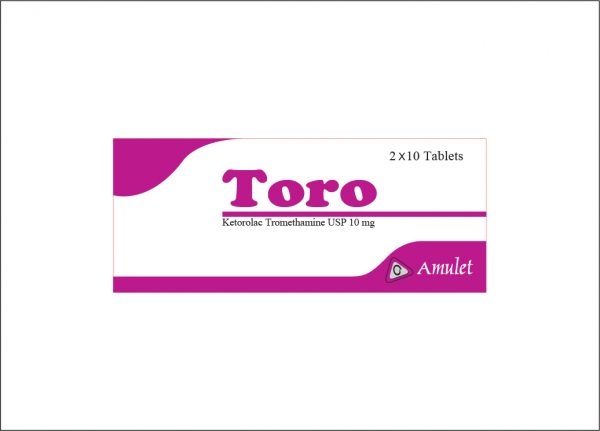ঔষধের বিস্তারিত বা বিকল্প ঔষধ জানতে ঔষধের নাম দিয়ে সার্চ দিন। যেমন- Napa বা Alatrol বা Amodis
Toro 10mg
TabletKetorolac Tromethamine
Amulet Pharmaceuticals
Other Strength:
- Ketoroz 10mg
Alternative:
- Xidolac Meltab 10mg
- WINOP 10mg
- Torax 10mg
- Zeropain 10mg
- Toramax 10mg
- Minolac 10mg
- Analac 10mg
- Ketofast 10mg
- Doltro 10mg
- Xiroket 10mg
- Tolec 10mg
- Ketoroz 10mg
- Ketobe 10mg
- Lacor 10mg
- Rolac 10mg
- Rolac MDT 10mg

Toro
DESCRIPTION:
TORO (Ketorolac Tromethamine) is a drug of pyrrolo-pyrrole group of nonsteroidal anti-inflammatory drug (NSAID). Ketorolac Tromethamine inhibits synthesis of prostaglandins and may be considered as a peripherally acting analgesic. The biological activity of Ketorolac Tromethamine is associated with the S-form. Pharmacokinetic property of Ketorolac Tromethamine is linear. It is highly protein bound and is largely metabolized in the liver. The products of metabolism and some unchanged drugs are excreted in the urine.
COMPOSITION:
TORO Tablet : Each film coated tablet contains Ketorolac Tromethamine USP 10 mg.
INDICATION:
TORO tablets are indicated for the short-term management of moderate to severe acute post-operative pain.
DOSAGE & ADMINISTRATION:
Ketorolac tablets are recommended for short-term use only (up to 7 days) and are not recommended for chronic use. Doses exceeding 40 mg per day are not recommended. For patients receiving parenteral Ketorolac tromethamine, and who are converted to Ketorolac tromethamine oral tablets, the total combined daily dose should not exceed 90 mg (60 mg for the elderly, renal-impaired patients and patients less than 50 kg) and the oral component should not exceed 40 mg on the day the change of formulation is made. Patients should be converted to oral treatment as soon as possible.
CONTRAINDICATION & PRECAUTION:
Ketorolac tromethamine is contraindicated in patients having hypersensitivity to this drug or other NSAIDs and those patients in whom aspirin or other prostaglandin synthesis inhibitors induce allergic reactions. It is also contraindicated in a history of peptic ulcer or gastro-intestinal bleeding, moderate or severe renal impairment (serum creatinine> 160 micromol/l), a history of asthma, children under 16 years of age. Ketorolac tromethamine is contraindicated as prophylactic analgesia before surgery due to inhibition of platelet aggregation and is contra-indicated intraoperatively because of the increased risk of bleeding.It is also contraindicated during pregnancy, labor, delivery or lactation. Patients over the age of 65 years may be at a greater risk of experiencing adverse events than younger patients. Ketorolac tromethamine can cause gastro-intestinal irritation, ulcers or bleeding in patients with or without a history of previous symptoms. Bronchospasm may be precipitated in patients with a history of asthma. Since ketorolac tromethamine and its metabolites are excreted primarily by the kidney, patients with moderate to severe impairment of renal function (serum creatinine greater than 160 micromol/l) should not receive. Fluid retention and oedema have been reported with the use of Ketorolac romethamine.
SIDE EFFECT:
Commonly occurring side-effects are nausea, vomiting, gastro-intestinal bleeding,melaena, peptic ulcer, pancreatitis, anxiety, drowsiness, dizziness, headache, hallucinations, excessive thirst, inability to concentrate, insomnia, malaise, fatigue, pruritus, urticaria, skin photosensitivity, Lyell’s syndrome, Stevens-Johnson syndrome, flushing, bradycardia, hypertension, palpitations, chest pain, infertility in female, dyspnoea, asthma, pulmonary oedema, fever, injection site pain.
DRUG INTERACTION:
Ketorolac tromethamine should not be used with other NSAIDs or in patients receiving aspirin because of the potential for additive side-effects. Care should be taken when administering Ketorolac tromethamine with anti-coagulants since co-administration may cause an enhanced anti-coagulant effect. Ketorolac tromethamine and other non-steroidal anti-inflammatory drugs can reduce the anti-hypertensive effect of beta-blockers and may increase the risk of renalimpairment when administered concurrently with ACE inhibitors, particularly in volume depleted patients. Caution is advised when methotrexate is administered concurrently, since some prostaglandin synthesis inhibiting drugs have been reported to reduce the clearance of methotrexate, and thus possibly enhance its toxicity. Probenecid should not be administered concurrently with ketorolac tromethamine because of increases in ketorolac plasma level and half-life.
USE IN PREGNANCY AND LACTATION:
Safety in human pregnancy has not been established. Ketorolac has been detected in human milk at low levels. Ketorolac is therefore contraindicated during pregnancy, labour or delivery, or in mothers who are breast feeding.
STORAGE CONDITION:
Store in a cool and dry place, away from light. Keep out of the reach of children.
HOW SUPPLIED:
TORO Tablet : Box containing 2×10’s tablet in Alu-Alu blister pack.
এই পাতাটি ২০০ বার দেখা হয়েছে
রাজডক কী?
ফ্রী সদস্য হোন Click Here
ডাক্তার হিসাবে যোগদান করতে Click Here
নার্স / টেকনোলজিস্ট হিসাবে যোগদান করতে Click Here
ফ্রী সদস্য হোন Click Here
ডাক্তার হিসাবে যোগদান করতে Click Here
নার্স / টেকনোলজিস্ট হিসাবে যোগদান করতে Click Here

